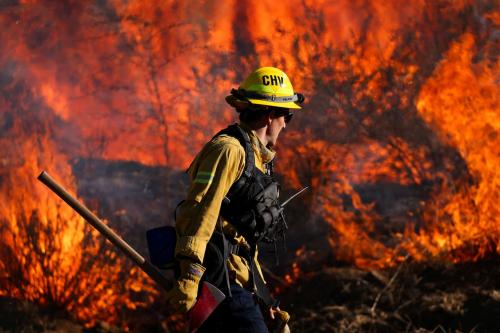More than 300,000 people have died in the Darfur region of Sudan from starvation, disease and violence during the past two years. How many more deaths will be tolerated before the international community will act? The United Nations’ latest report on Darfur calls for the arrest and prosecution, by the International Criminal Court, of Sudanese government officials and Arab militias responsible for the killings, rapes and deportations of ethnic black African villagers. In response, Secretary-General Kofi Annan has called for Security Council sanctions.
Despite such apparent progress, those hoping to punish those responsible for the deaths in Darfur still face significant challenges.
First, it is important to recall the reasons why Sudan has been able to get away with murder in Darfur. Sudan is not unique among governments in using excessive force and brutality against rebellious ethnic or racial groups seeking greater autonomy.
In the past, Russia threatened to use its veto in the Security Council to stop strong action in Sudan. It no doubt fears a precedent could be set applicable to its scorched-earth campaign against the Chechens.
The political and economic interests of the Security Council’s member states are another major impediment. In addition to Arab-Islamic ties of Pakistan and Algeria, which might make them more sympathetic with the Khartoum regime, China is the main foreign investor in Sudan’s oil industry. It has opposed sanctions.
Even the United States, which favors sanctions, has not wanted to press Sudan too hard, fearing it might jeopardize the peace agreement, signed last month, ending the 20-year civil war between the Arab government and the black African tribes in the south.
Third, even if the Security Council were interested in stopping the killings, there exists no international machinery to protect civilians in internal crises that do not cross international boundaries.
The United Nations’ Annan may speak of an international “responsibility to protect,” but only in a small number of cases has the council authorized the use of force to shield internally displaced persons and other civilians at risk.
There is a Genocide Convention, but there are no international mechanisms for preventing genocide or mass killings, and no enforcement machinery.
Moreover, the U.S. invasion of Iraq has made many highly suspicious of any discussion of international humanitarian intervention in Sudan. The slightest mention of the option arouses fears that America is preparing to invade another Islamic country and evokes loud protests from the Muslim world.
Africa’s secondary status is also a factor. As Morton Abramowitz and Samantha Power pointed out in The Washington Post last year, the international system is “broken when it comes to Africa.” Western governments do not consider it in their national or strategic interest to take the political, financial or military risks needed to stop killings on the African continent.
Despite these obstacles, opportunities do exist to bring pressure on the Sudanese government. The African Union, the continent’s regional body, has deployed more than 1,200 observers, police and peacekeepers in Darfur to monitor the cease-fire between the government and rebels and boost security.
This number is far too small. Many thousands more should be airlifted into Darfur and an estimated $220 million made available to support the expanded mission. The United Nations reports that only $26 million had been received by the end of November out of $44 million requested for the current mission.
The African Union must also be ready to carry out its commitment of October to protect civilians “under imminent threat.” Because the Sudanese government has opposed anything but a monitoring role for the organization, African Union forces have done little to protect displaced-persons camps or stop assaults on villagers.
A major diplomatic effort is needed to support the African Union and press Sudan to allow those forces to play a direct protection role. This combination of regional forces backed by international support has the potential to offer a more robust response to the conflict in Darfur.
Another important step would be to extend last month’s landmark peace agreement between the Khartoum government and the Southern People’s Liberation Movement to Darfur.
Donor governments and the World Bank should follow the Netherlands’ example and hold up all economic aid, investment or debt relief promised to Sudan until it brings the atrocities in Darfur to an end.
The United States and its allies should encourage governments such as China and Pakistan to use their leverage with Sudan. And Annan should consider something daring, like leading all Security Council members to Darfur on a mission to put the issue back on the front pages and mobilize support for sanctions.



Commentary
Op-edGlobal Effort Is Needed in Darfur
February 6, 2005